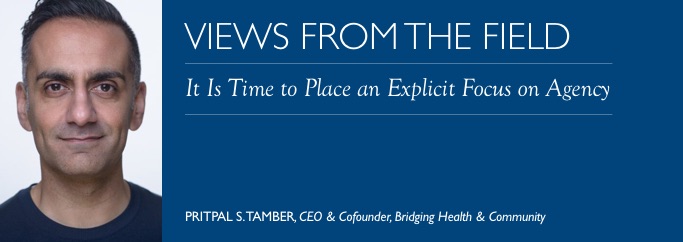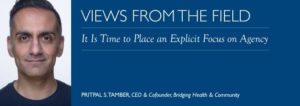
There is a risk that initiatives resulting from the health sector’s growing enthusiasm for influencing social determinants will be too limited to meet the mark because they leave out the knowledge and power of those most affected by the very challenges they intend to address. To truly embrace meaningful and effective solutions, there are key ways in which philanthropy could play a pioneering role.
The Limitations
An example of how this risk might play out can be seen in how population health has fallen short of its potential. In its origins, population health asked us to think not only about health outcomes within a group but also the reasons for differences in those outcomes. This opened up the possibility to examine the influence of people’s day-to-day choices, environments, and social circumstances—the social determinants of health. However, many population health initiatives are about delivering medical care to more people, leaving little space to address other factors except as context for people’s ability to consume care.
The concept of value-based health care provides a similar lesson. In its origins was the possibility to have a conversation about what matters to people. This would have revealed that retaining health, which increasingly means living with chronic illness, is only one of many priorities people juggle, along with things like economic security, family support or spiritual nourishment. We would have seen health for what it really is—a means to the ends that people value, not the end itself.
What is limiting in these examples is that both continue to view health as primarily the concern of the health sector—despite increasing awareness that the vast majority of our health comes down to our day-to-day choices, environments, and social circumstances. As long as the health sector is the main driver of the conversation, the resulting work drifts towards sickness, too narrowly defining what we measure and remunerate.
What People Value
Work on the social determinants of health needs to involve other sectors, but also needs to be framed by what people value. It is a basic tenet of influence and change that you start from what people care about. This has been my focus since being the Physician Editor of TEDMED 2013 convinced me that little of the innovation in health was likely to affect those suffering the worst health outcomes—those in the most difficult social circumstances.
For the past four years I have spent time with almost 100 innovative practitioners, looking for patterns across their work. Along the way, I cofounded a nonprofit and we have gleaned 12 guiding principles for what it means to genuinely and effectively work with communities. The principles describe a way of working—new to many in health—that is inclusive, participatory, and responsive.
- Include in a community’s collective effort those who live there, those who work there, and those who deliver or support services provided there.
- Spend time understanding differences in context, goals and power.
- Appreciate the arc of local history as part of the story of a place.
- Elicit, value, and respond to what matters to community residents.
- Facilitate and support the sharing of power, including building the capacity to use it and acknowledging existing imbalances.
- Operate at four levels at the same time: individual, community, institutional, and policy.
- Accept that this is long-term, iterative work.
- Embrace uncertainty, tension, and missteps as sources of success.
- Measure what matters, including the process and experience of the work.
- Build a vehicle buffered from the constraints of existing systems and able to respond to what happens, as it happens.
- Build a team capable of working in a collaborative, iterative way, including being able to navigate the tensions inherent in this work.
- Pursue sustainability creatively; it is as much about narrative, process, and relationships as it is about resources.
Beyond Risk Factors
As these principles surfaced, I asked myself what they were for. Sure, they describe a process but what is the product of that process? The many practitioners I have spent time with have taught me that what matters is whether people are engaged, able to think beyond the present, and confident they can affect the world around them. I learned that this can be summed up as having agency – the ability to make purposeful choices.
The concept of agency has sat squarely in the research that is now packaged as the social determinants of health. Risk factors—whether personal, environmental, or social—explain less than half of why people are healthy or sick. The rest seems to come down to whether they have a sense of control over their lives, which requires agency. And yet we rarely see fostering agency embedded in work trying to influence health.
It is time to embrace the importance of agency. You can see it from the perspective of the research or you can listen to courageous practitioners working deeply with communities. Agency matters.
Philanthropy’s Role
The field of practice capable of fostering agency needs to be supported. What does it take to apply the principles we have described into practice? What are the challenges and what can we create to overcome them? How do we get more people trying? And how do we evaluate this kind of work, without limiting its success to sickness-defined health outcomes?
If philanthropy is to support this work it must also look in the mirror. How well do its processes align with the 12 principles, and hence the importance of fostering agency? In our experience, governance structures are very much at odds with the principles, as are accountability frameworks—most of which lean heavily towards sickness-defined outcomes. Both diminish agency.
Without an explicit focus on agency, most current work on social determinants of health is likely to fail. It will become yet another strategy subverted by seeing it only through the lens of the health sector. Philanthropy can help avoid this. Not only by providing the patient, long-range capital needed to grow the field of practice, but also by changing how it operates.

